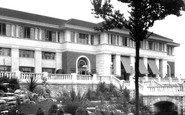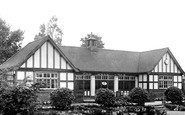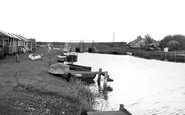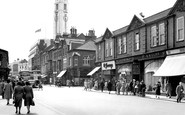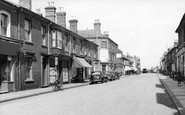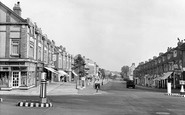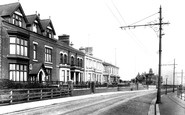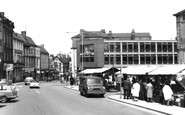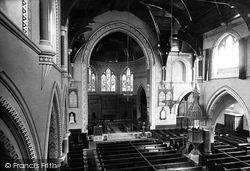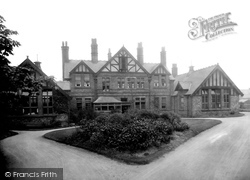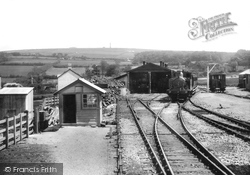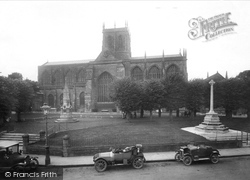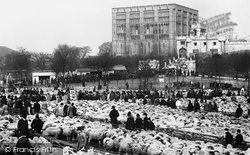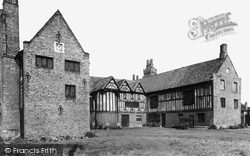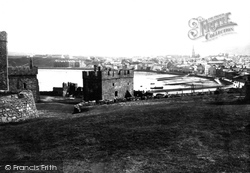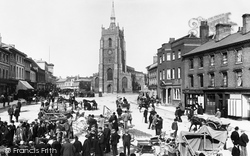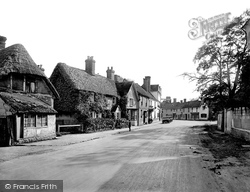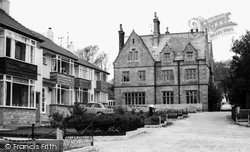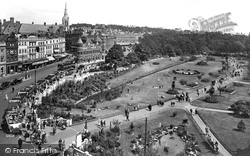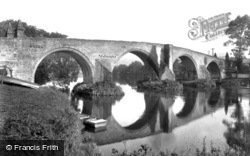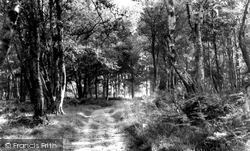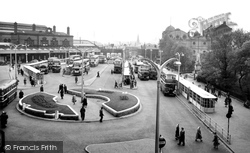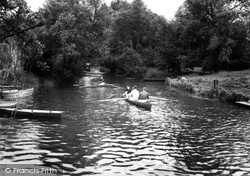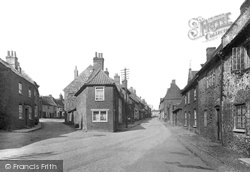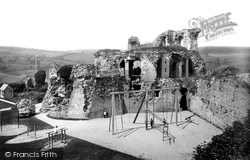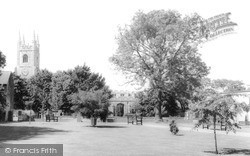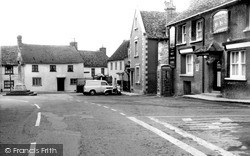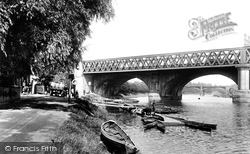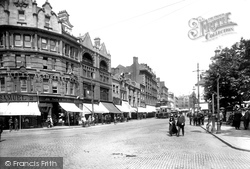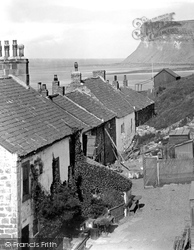Merry Christmas & Happy New Year!
Christmas Deliveries: If you placed an order on or before midday on Friday 19th December for Christmas delivery it was despatched before the Royal Mail or Parcel Force deadline and therefore should be received in time for Christmas. Orders placed after midday on Friday 19th December will be delivered in the New Year.
Please Note: Our offices and factory are now closed until Monday 5th January when we will be pleased to deal with any queries that have arisen during the holiday period.
During the holiday our Gift Cards may still be ordered for any last minute orders and will be sent automatically by email direct to your recipient - see here: Gift Cards
Places
26 places found.
Those places high-lighted have photos. All locations may have maps, books and memories.
- Town End, Derbyshire
- Town End, Buckinghamshire
- Town's End, Somerset
- Towns End, Dorset
- Town End, Merseyside
- Town End, Cambridgeshire
- Town's End, Buckinghamshire
- West End Town, Northumberland
- Bolton Town End, Lancashire
- Kearby Town End, Yorkshire
- Town End, Cumbria (near Grange-Over-Sands)
- Town End, Cumbria (near Bowness-On-Windermere)
- Town End, Yorkshire (near Huddersfield)
- Town End, Yorkshire (near Wilberfoss)
- Town End, Cumbria (near Appleby-in-Westmorland)
- Town's End, Dorset (near Melbury Osmond)
- Town's End, Dorset (near Swanage)
- Town End, Cumbria (near Ambleside)
- Town End, Cumbria (near Lakeside)
- Town End, Cumbria (near Kirkby Lonsdale)
- Town End, Cumbria (near Ambleside)
- Town's End, Dorset (near Bere Regis)
- West-end Town, South Glamorgan
- Townend, Derbyshire
- Townend, Strathclyde (near Dumbarton)
- Townend, Staffordshire (near Stone)
Photos
23 photos found. Showing results 481 to 23.
Maps
195 maps found.
Books
3 books found. Showing results 577 to 3.
Memories
3,720 memories found. Showing results 241 to 250.
Dancing At The Pavilion
My name is Brian Johnson and I was born in Bear Cross, Kinson, Bournmouth in 1934. Twenty years later I used to spend most Saturday evenings dancing at the Pavilion or The Town Hall. On a Sunday we used to go to the ...Read more
A memory of Bournemouth in 1954 by
Sunday At The Dell
During the long summer Sundays of 1947, the pleasures that were afforded by many Doncastrians were few and far between.Sunday, being a non-work day for the man of the house (if not the woman, Sunday dinner to make, pots to wash, ...Read more
A memory of Doncaster in 1947 by
Cargo Fleet
I lived in Cargo Fleet as a young child, having moved from Australia. My grandmother was born in Cargo Fleet, and she ended up returning with my grandfather, where they purchased a shop on the corner of Bristol Street. We lived up the ...Read more
A memory of Cargo Fleet in 1977 by
What A Shame
I've lived in Spalding for the last 33 years and before that Tongue End. Up until 10 years ago Spalding was a lovely place to live, not now though. I remember walking through the town and people were friendly, yes there were fights but ...Read more
A memory of Surfleet by
My Chatham
Born and bred in Grove Road off Luton Road, went to the schools of All Saints and Fort Luton. I found Chatham to be a friendly town with memories of seeing Arther English at the Empire, seaside at the Strand, being a 19th Medway west boy ...Read more
A memory of Chatham by
The Good Old Days
I was born in Luton in the 1940s and remember well the shops in Manchester Street with WG Durrants butchers on the corner of Manchester Street and Bridge Street. Next door in Bridge Street was a garage and further along Manchester ...Read more
A memory of Luton by
The Wolverton Palais
I remember the"Palais de Dance"in Wolverton. They used to put some great bands on there. We used to come up from Fulham in London 7 or 8 times a year to go there. The people of Wolverton were some of the friendliest people we ...Read more
A memory of Wolverton in 1965 by
Selsdon Parade Residential Flat
My family and my father's before that (surname Kent) lived in Selsdon (84 and 32 Foxearth Road, 170 Littleheath Road, and 24 Benhurst Gardens) spanning c. 1930 - 1989. But at one point (after my father's death), my ...Read more
A memory of Selsdon in 1982 by
13 The Cliff
My Mam and Dad who lived in the town for over 45 years until they moved to Adelaide 16 years ago have recently moved back to Seaton Carew and bought 13a The Cliff (which is the first house you can see from left to right in picture). ...Read more
A memory of Seaton Carew in 2012 by
Market Days
I remember the various market stalls well, and the market cafe where you could be a greasy bacon cob, and a well stewed tea from the giant tea pot ! I used to buy a bundle of nylon stockings from a stall on the town hall corner. There was ...Read more
A memory of Worksop in 1966 by
Captions
5,054 captions found. Showing results 577 to 600.
The parish church of St John was described as 'one of the architectural ornaments of the town', and the interior came in for much praise.
It was designed by James Wilding, a Liverpool man who was associated with a number of buildings in the town and who also played an important part in the development of Runcorn Hill as a park once the
Note the engine shed and the load gauge in the goods yard. The station was at Kelly Bray, just north of the town, and it survived until 1966.
Sherborne Abbey is the burial place of two Saxon kings, Ethelbald and Ethelbert, the two elder brothers of Alfred the Great.
At the time of the Conquest, Norwich was both an important town and a major port. Control was quickly established with the erection of one of the earliest motte and bailey castles in England.
The Old Hall, very much the finest building in the town and now largely surrounded by Victorian housing, sits in its grassy square, a potent reminder of the town's great medieval past.
Magnus Barefoot built a timber fort on St Patrick's Isle in about 1098-1103; the bulk of the surviving fortifications date from the time of Thomas, First Earl of Derby, and were constructed in 1460-1504
Sudbury, on the River Stour, was once an important cloth town, and has always had a popular market. Market Hill is lined with elegant Georgian buildings, with St Peter's Church at the top.
The West Lodge and Gates are at the head of De Parys Avenue.
The Romans built a town here, though its ramparts are now only faintly recognisable, and in Saxon times it was the bishopric for Wessex and Mercia.
On the site of the gardens of the Old Rectory was the windmill, which burned down in 1802 and yet again within 30 years.
In 1925 the Square was beginning to show the degree of traffic problems that were to blight the town in future years.
The town and its castle have therefore been fought over on numerous occasions. Dating from about 1400, the bridge was for years one of only a handful of crossing points over the Forth.
The town and its castle have therefore been fought over on numerous occasions. Dating from about 1400, the bridge was for years one of only a handful of crossing points over the Forth.
Some parts of Victoria Park were left as woodland, and bracken, silver birch and oak thrive. It would be difficult to guess from the photograph that this was in the centre of a town.
In 1770 there were 5,000 people living in the town, and by 1811 there were 15,083, three times that number; by 1835 the population had doubled again.The railway to Preston opened in 1846, but the
Just as they do today, the boys who lived in this historic town - Fordwich is the smallest town in Britain - enjoyed boating on the River Stour which ebbed and flowed between Canterbury and the sea.
A number of these houses have been converted into shops to cater for the visitors and pilgrims who flock to this town and visit the shrine of Our Lady of Walsingham.
Throughout the First Civil War, both town and castle were held by the Royalists, and as such was one of the last to surrender.
Following the death of the owner, the site was acquired by the town and first opened to the public in 1960.
Westport was separated from Malmesbury as it was situated outside the west gate to the town, and it was linked to the town by Abbey Row.
Spilling down from the Yorkshire Dales, the Ribble streams under the lovely old bridge at Settle and through the valley that has taken its name.
Note the many shop awnings and the trams further down the street, a reminder of town centre public transport.
This, the original hamlet on the shore, consisted of fishermen's cottages and the Ship and Nimrod Inns. Henry Pease was said to have had a vision of 'a town arisen on the edge of a cliff'.
Places (26)
Photos (23)
Memories (3720)
Books (3)
Maps (195)



